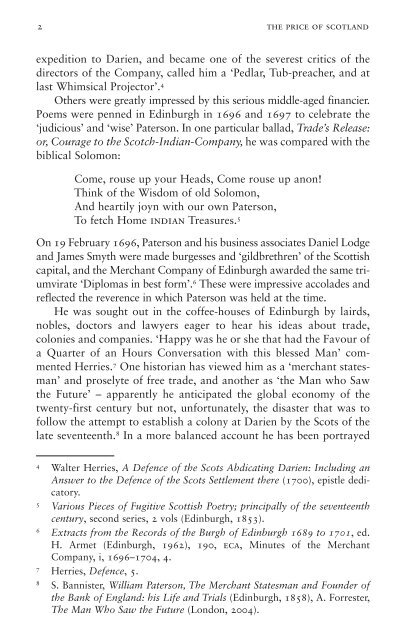Create successful ePaper yourself
Turn your PDF publications into a flip-book with our unique Google optimized e-Paper software.
<strong>Price</strong> <strong>of</strong> <strong>Scotland</strong> B format_Layout 1 03/11/2020 11:09 Page 2<br />
2 the price <strong>of</strong> scotland<br />
expedition to Darien, and became one <strong>of</strong> the severest critics <strong>of</strong> the<br />
directors <strong>of</strong> the Company, called him a ‘Pedlar, Tub-preacher, and at<br />
last Whimsical Projector’. 4<br />
Others were greatly impressed <strong>by</strong> this serious middle-aged financier.<br />
Poems were penned in Edinburgh in 1696 and 1697 to celebrate the<br />
‘judicious’ and ‘wise’ Paterson. In one particular ballad, Trade’s Release:<br />
or, Courage to the Scotch-Indian-Company, he was compared with the<br />
biblical Solomon:<br />
Come, rouse up your Heads, Come rouse up anon!<br />
Think <strong>of</strong> the Wisdom <strong>of</strong> old Solomon,<br />
And heartily joyn with our own Paterson,<br />
To fetch Home indian Treasures. 5<br />
On 19 February 1696, Paterson and his business associates Daniel Lodge<br />
and James Smyth were made burgesses and ‘gildbrethren’ <strong>of</strong> the Scottish<br />
capital, and the Merchant Company <strong>of</strong> Edinburgh awarded the same triumvirate<br />
‘Diplomas in best form’. 6 <strong>The</strong>se were impressive accolades and<br />
reflected the reverence in which Paterson was held at the time.<br />
He was sought out in the c<strong>of</strong>fee-houses <strong>of</strong> Edinburgh <strong>by</strong> lairds,<br />
nobles, doctors and lawyers eager to hear his ideas about trade,<br />
colonies and companies. ‘Happy was he or she that had the Favour <strong>of</strong><br />
a Quarter <strong>of</strong> an Hours Conversation with this blessed Man’ commented<br />
Herries. 7 One historian has viewed him as a ‘merchant statesman’<br />
and proselyte <strong>of</strong> free trade, and another as ‘the Man who Saw<br />
the Future’ – apparently he anticipated the global economy <strong>of</strong> the<br />
twenty-first century but not, unfortunately, the disaster that was to<br />
follow the attempt to establish a colony at Darien <strong>by</strong> the Scots <strong>of</strong> the<br />
late seventeenth. 8 In a more balanced account he has been portrayed<br />
4<br />
Walter Herries, A Defence <strong>of</strong> the Scots Abdicating Darien: Including an<br />
Answer to the Defence <strong>of</strong> the Scots Settlement there (1700), epistle dedicatory.<br />
5<br />
Various Pieces <strong>of</strong> Fugitive Scottish Poetry; principally <strong>of</strong> the seventeenth<br />
century, second series, 2 vols (Edinburgh, 1853).<br />
6<br />
Extracts from the Records <strong>of</strong> the Burgh <strong>of</strong> Edinburgh 1689 to 1701, ed.<br />
H. Armet (Edinburgh, 1962), 190, eca, Minutes <strong>of</strong> the Merchant<br />
Company, i, 1696–1704, 4.<br />
7<br />
Herries, Defence, 5.<br />
8<br />
S. Bannister, William Paterson, <strong>The</strong> Merchant Statesman and Founder <strong>of</strong><br />
the Bank <strong>of</strong> England: his Life and Trials (Edinburgh, 1858), A. Forrester,<br />
<strong>The</strong> Man Who Saw the Future (London, 2004).


















